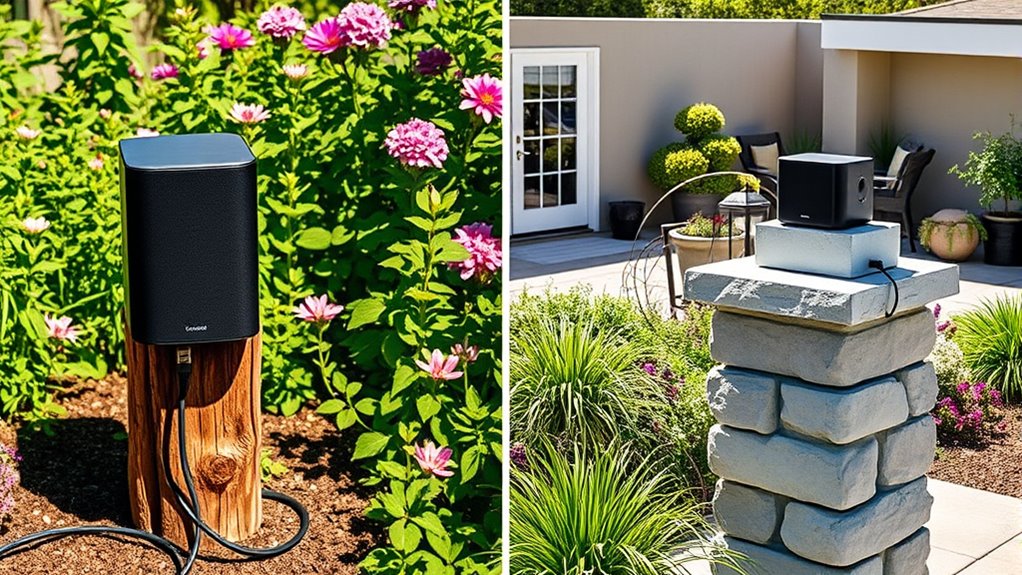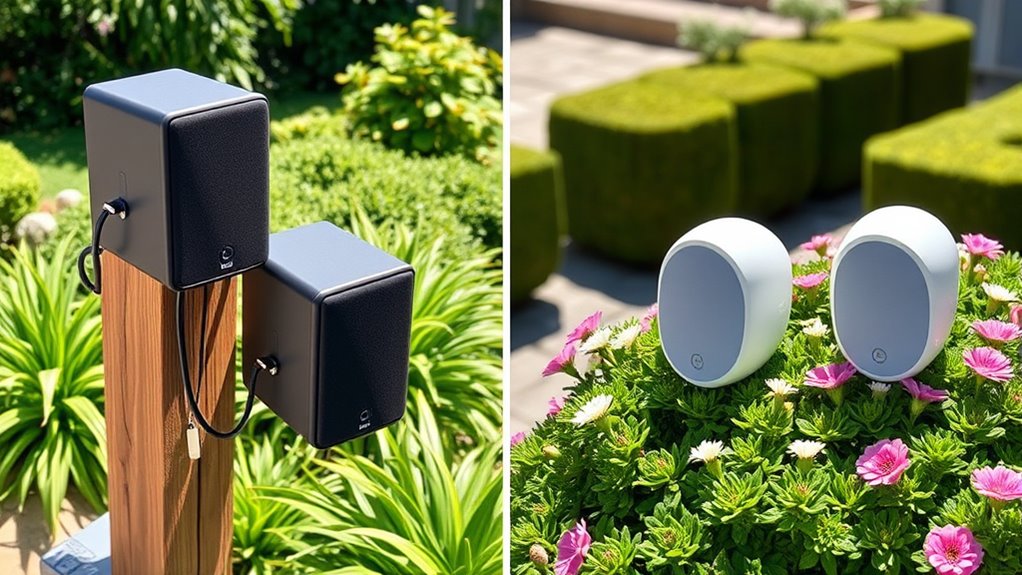Wired outdoor speakers offer reliable sound quality and a stable connection, but require running cables through walls or ground, which can be complex and less flexible. Wireless options are easier to install, portable, and adaptable to different locations but may face interference and occasional disconnections. Your choice depends on whether you prioritize sound fidelity and permanence or convenience and mobility. Keep exploring to discover the best setup tailored to your outdoor space.
Key Takeaways
- Wired outdoor speakers offer more stable connections and superior sound quality, ideal for permanent setups.
- Wireless outdoor speakers are easier to install and reposition, suitable for temporary or flexible arrangements.
- Wired systems require complex wiring and professional installation, while wireless setups are quick and cable-free.
- Wireless speakers may experience signal interference and occasional disconnections, affecting reliability.
- Wired speakers tend to be more cost-effective long-term, whereas wireless options often come at a higher initial price.

Outdoor speakers enhance your entertainment experience by delivering quality sound in open-air settings. Whether you’re hosting a backyard gathering or relaxing on your patio, choosing the right type of speaker is vital for ideal audio performance. Wired and wireless outdoor speakers each have their advantages and challenges, so understanding their differences helps you make an informed decision.
Installing wired speakers can be more complex than their wireless counterparts. You might need professional help to run cables through walls, underground, or across your yard, especially if you want a clean, seamless look. Managing these cables can be tricky, requiring additional hardware like conduit or in-wall wiring. This setup process can be time-consuming and costly, but it often results in a more reliable and stable connection. Wired speakers provide superior sound quality since they’re hardwired directly to your audio source. This direct connection ensures crisp, clear audio without the risk of signal compression or interference. Audiophiles prefer wired systems because they deliver a true-to-sound experience, free from wireless transmission limitations. Additionally, wired systems are less susceptible to issues caused by wireless interference, ensuring consistent audio performance.
In contrast, wireless speakers are generally easier to install. They eliminate the need for cables, making setup quick and straightforward—perfect if you want flexibility or plan to move your speakers around. You can place wireless speakers anywhere within range of your Wi-Fi or Bluetooth connection, which offers great convenience for outdoor events or temporary setups. You don’t have to worry about running cables through walls or digging trenches, saving time and effort. However, wireless connections can sometimes suffer from signal loss or interference, especially in areas with many competing wireless devices. Although wireless technology has improved, sound quality may still be compromised compared to wired systems. Wireless signals can be affected by obstacles and other electronic devices, which can impact performance.
Wired speakers tend to be more dependable and stable. They offer minimal latency and are less prone to disconnection, making them ideal for critical audio needs or permanent installations. Wireless options, while portable and flexible, require occasional re-pairing and can disconnect unexpectedly, which can disrupt your listening experience. On the flip side, wireless speakers shine in portability. You can easily move them to different spots in your yard or take them with you on outdoor adventures like beach days or picnics.
Compatibility is another factor to think about. Wired systems work well with a wide range of audio sources, including vintage equipment, and can be integrated into more complex setups. Wireless speakers usually rely on Bluetooth or Wi-Fi, sometimes needing extra hardware to connect with older or non-compatible devices. Budget-wise, wired systems often come at a lower long-term cost, especially since they don’t require additional hardware or frequent replacements. Wireless systems might include extra features but tend to be pricier and potentially more expensive to install if professional help is needed.
Frequently Asked Questions
How Do Outdoor Speaker Batteries Last During Extended Use?
You wonder how outdoor speaker batteries hold up during extended use. Battery life varies from 7 to 32 hours depending on the model and usage. High-end speakers like the JBL Charge 5 can last up to 20 hours, while budget options may only reach 7 to 9 hours. To maximize longevity, keep volume moderate, avoid overusing features, and use quick-charge or portable power banks to extend playtime outdoors.
Are Wireless Outdoor Speakers More Vulnerable to Hacking?
Imagine your outdoor speaker as a friendly neighbor—trustworthy until someone sneaks in uninvited. Wireless outdoor speakers are more vulnerable to hacking because they rely on Bluetooth, which has known security flaws. With vulnerabilities like Bluesnarfing and Blueborne, attackers nearby can hijack your device or steal data. To stay safe, keep firmware updated, turn off discoverability, and avoid personal device names, reducing your risk of intrusion.
Can Wired Speakers Be Easily Hidden in Outdoor Spaces?
You can hide wired outdoor speakers effectively by using natural and structural elements. Mount them behind plants, shrubs, or under eaves, or suspend smaller ones from trees. Conceal cables inside walls, under decks, or along baseboards using raceways, paintable conduits, or flat wires. Routing cables through tight spaces and sealing holes helps keep wiring discreet. While some areas pose challenges, careful planning and proper concealment techniques make hiding wired speakers quite achievable.
What Maintenance Do Outdoor Wireless Speakers Require?
Think of your outdoor wireless speakers as garden plants—they need regular care to thrive. You should wipe them with a soft, damp cloth to keep dust away, avoiding harsh cleaners. Protect them from weather by using covers and placing them in shaded spots. Remember to recharge batteries, check for damage, and tighten loose parts. Just like tending a garden, consistent maintenance keeps your speakers sounding great and lasting longer outdoors.
Do Outdoor Speakers Work With All Types of Smartphones?
You might wonder if outdoor speakers work with all types of smartphones. Most Bluetooth-enabled outdoor speakers connect with any smartphone that supports Bluetooth, whether Android or iOS. WiFi-based options like AirPlay 2 are mainly compatible with iPhones or Apple devices. Wired speakers work with any smartphone that has the right audio port or adapter. So, check your connection type and device compatibility to guarantee seamless outdoor audio enjoyment.
Conclusion
Choosing between wired and wireless outdoor speakers depends on your needs, but did you know that wireless speakers now make up over 60% of the outdoor audio market? With easier installation and no tangled cables, wireless options offer convenience and flexibility. Whether you prefer the reliability of wired systems or the mobility of wireless ones, understanding the differences helps you make the best choice. Now, you can enjoy your outdoor space with sound that perfectly suits your lifestyle.









